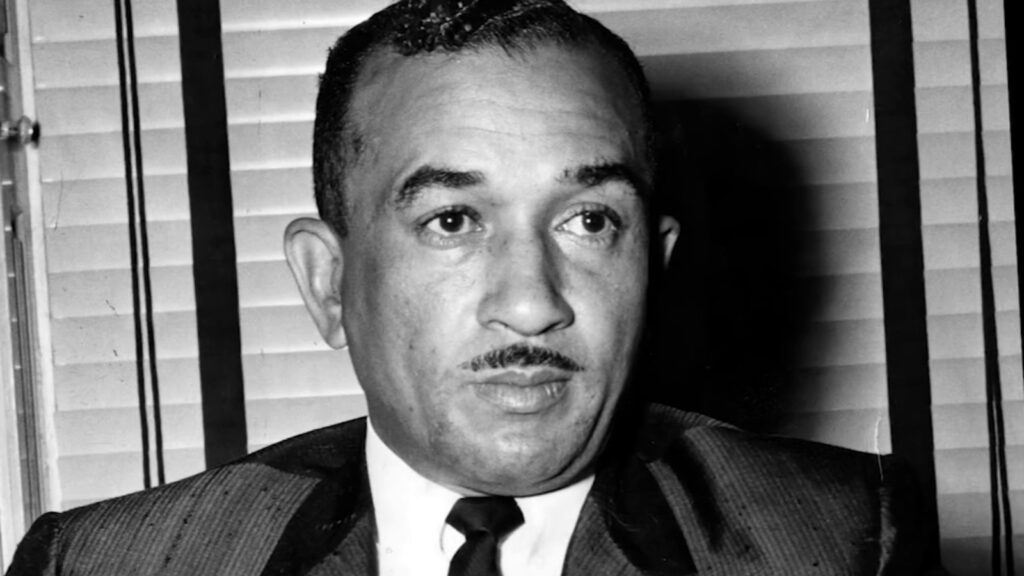
Cecil B. Moore, head of the Philadelphia chapter of the NAACP in the 1960s. (Courtesy Temple University Community Affairs)
At the retirement subdivision where I live in Las Vegas, there was a ceremony on Memorial Day morning 2022 in front of the community center. I had read about it in the subdivision’s newsletter and promptly forgot until Ida, my wife, and I were walking toward the center to use the fitness equipment. It was good to get out for a walk to the center early in the morning before it got too hot. There was a group of about fifty people there, all retirees or nearly so, as well as a man in uniform leading the ceremony. A recording of “Reveille” was played, and the nation’s flag was raised, then lowered again to half-staff (in mourning for the Uvalde massacre). Ida and I stopped and watched. We were asked to recite the Pledge of Allegiance. I had not done so in years, not since my schoolboy days when, in elementary school, our Black teachers had their Black pupils say it every day at the start of class. I remember my mother telling me in those days that she did not like President Eisenhower adding the phrase “under God.” She preferred the version that she learned in school. She never told me why she did not like the new version. Maybe it is that people have a sentimental attachment to something they learned as children and a change actually wounds them in some way, makes them think that the modern world is trying to invalidate them. “It’s not necessary,” was all she said to me. Of course, I remembered the Pledge instantly and found myself reciting it. As a child, I was very patriotic. All of us in my school were. We were taught a song called “I Like It Here” that we loved to sing better than the national anthem, because it was so jaunty and bouncy.
I like the United States of America
I like the way we all live without fear
I like to vote for my choice
Speak my mind and raise my voice
Yes, I like it here.
I am so lucky to be an American
And I am thankful each day of the year
For I can do as I please
Because I’m freer than the breeze
Yes, I like it here.
We sang this fervently, without any trace of irony. We were proud to be Americans, “groomed to it,” to use a phrase. I do not regret this at all, for as I recall I think most of us were happy as children. Our circumstances were not such that we thought, I suppose, that it was self-evident that we should be unhappy. I do not think, for quite a while in my childhood, I really knew what unhappiness was and certainly did not know what racial grievance was or what it was to be unhappy as a Black person. In some ways, I, and many of my friends, had to be told that we were unhappy or that we should be unhappy. I do not blame the people who did this. They thought they were helping us and perhaps they were, grooming us in another way, or “grooving” us like a phonograph record or like a dance beat. They felt they were preparing us for a harsh reality we were on a collision course to meet.
Most of the people at the Memorial Day ceremony at the subdivision were White but there was a sprinkling of Blacks here and there. They displayed no reluctance about the ceremony, saluting the flag, reciting the Pledge, and singing the national anthem. They were quite fervent, actually, as I was as a child. Seeing them reminded me of Cecil B. Moore, the head of the Philadelphia chapter of the NAACP in the 1960s, foul-mouthed, hard-drinking, militant to the core, telling the Whites how racist they were, who teared up whenever he heard the national anthem. He had been a Marine in the Pacific theater during WWII. It meant a lot to him, being a Marine, the war, the chance to fight for his country, seeing men die for our country. Being a Black American is no little thing. I learned that much in my childhood, at last.
I was happy to recite the Pledge, to remember what it was like to be unbelievably happy to be called an American, to be an American. I was glad to relive that on this Memorial Day as we all stood before the community center, remembering the fallen.
